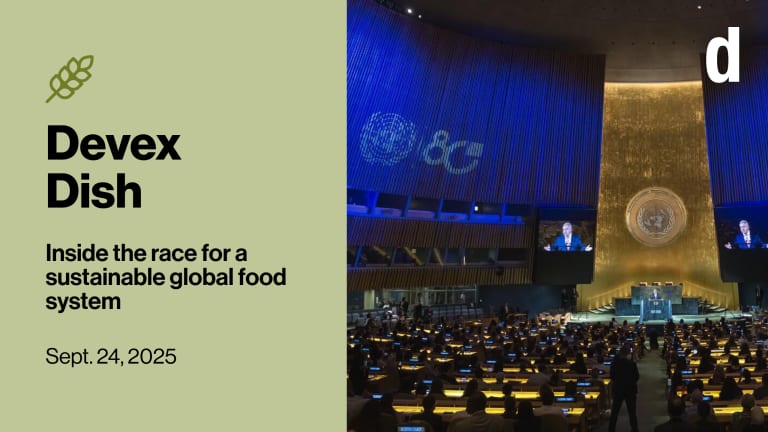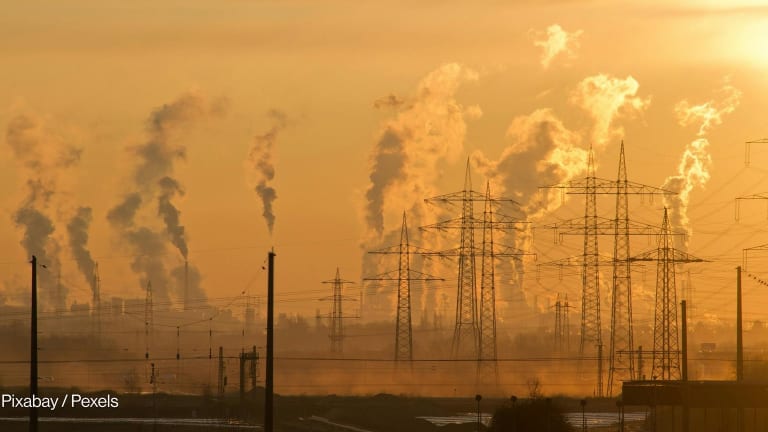
NEW YORK — As the dust settles from the whirlwind of one of global development’s busiest weeks, it is a time to figure out what might have a lasting impact.
Some issues rose to more prominence than expected, while others fell short. Education seems to have emerged as a winner, whereas TB’s moment in the spotlight failed to bring expected commitments.
Headlines announced the world’s laughter in response to United States President Donald Trump, but what will the few words he said about development mean for U.S. aid moving forward? How will the development community find ways to harness new technologies while protecting the world’s most vulnerable from potential downsides? And will the growing number of finance companies present result in more investment in critical development challenges?
This Global Goals week and the 73rd United Nations General Assembly raised many questions with few concrete answers. Here’s a look at some of the key events, conversations, and issues to come out of the meetings.
Trump, US development, and the UN
The U.S. government's UNGA delegation left behind a mixed impression of its evolving role in development cooperation. On one hand, U.S. officials and lawmakers championed new tools and approaches designed to bring America's engagement in developing countries into a more modern era. U.S. Congressman Ted Yoho, a Republican from Florida, and others spread the word to their donor counterparts and development partners about a new U.S. development finance institution, which is on the verge of coming to fruition. U.S. Agency for International Development Administrator Mark Green debuted the framework that will guide USAID's efforts under his tenure: The "journey to self-reliance."
At the same time, President Trump's speech to the General Assembly rehashed old visions of development assistance as a political tool for extracting reciprocal favors. "Moving forward, we are only going to give foreign aid to those who respect us and, frankly, are our friends,” Trump said.
In his speech, Trump did not highlight any specific U.S. development priorities but simply alluded to a process underway to examine U.S. foreign aid. This foreign assistance review has been a subject of concern and speculation within the U.S. development community for weeks, and Trump broke some news about how it will be carried out. The review was previously being run by the president's National Security Council. Now, it will be directed by Secretary of State Mike Pompeo.
What exactly that means for USAID and other development agencies remains to be seen, but Green told Devex he feels comfortable with the new arrangement.
Progress on TB and NCDs? Wait and see
Two pressing — yet often undetected and ignored — global health issues were on clear display at UNGA last week, as observers watched how, exactly, governments would confront the rising risks of tuberculosis and noncommunicable diseases during two day-long high-level meetings.
Read the full stories:
Various U.N. leaders and government ministers echoed the need to confront TB, which was responsible for 1.6 million deaths alone in 2017, and NCDs, which collectively are the cause of more than 70 percent of global deaths. Yet concrete, collective action to do so never fully materialized, according to civil society and public health experts.
In both cases, pressure from the U.S. government halted strong language in the political declarations on affordable drug access for patients. In the case of NCDs, the agreement placed the onus on individuals taking action to live healthier lives rather than on governments enforcing regulations on industry, or enacting tougher policies on recognized contributors to cardiovascular diseases, cancers, and diabetes — such as tobacco, alcohol, and sugary foods.
Still, as some experts pointed out, the sustained focus on TB throughout the week could, in and of itself, be a step in the right direction to prompt new research efforts and advocacy campaigns. It will be interesting to watch any developments around TB in the months to come, especially with the high-level meeting on universal health care in 2019. Similarly, as some governments addressed their national plans to tackle NCDs, it will be key to follow up on these commitments in the months and years to come.
Committing to education
Advocates were pleased to see education placed high on the agenda last week. It was the focus of a number of high-level events attended by senior development figures. The week kicked off with the launch of the International Finance Facility for Education, or IFFEd, about which World Bank President Jim Yong Kim said: “Let me be clear — we are completely behind IFFEd.”
International Finance Facility for Education musters growing support
Details emerged about the development of the fledgling IFFEd during the U.N. General Assembly.
On Wednesday, the leaders of Canada, France, and the United Kingdom hosted a session underscoring their commitment to give girls across the globe 12 years of free schooling and called on others to pledge the same. Also on Wednesday, 29 organizations made commitments to act at the High-Level Meeting on Action for Refugee Education.
The Global Partnership for Education and Education Cannot Wait both received new funding pledges. On Friday, a $100 million funding partnership between the Islamic Development Bank and the Qatar-based Education Above All Foundation was announced — it will offer loan financing for programs targeting out-of-school children and Mali is the first recipient.
A harsh humanitarian reality
Amidst the glitter and glam of some evening events last week, a few humanitarian and funding crises quietly played out at the U.N. headquarters. The situation in Yemen — often called the world's worst humanitarian crisis — continues to deteriorate, U.N. experts said in a meeting chaired by U.N. Under-Secretary-General and Emergency Relief Coordinator Mark Lowcock.
UN warns of worsening famine in Yemen
Deteriorating economic and security conditions are pushing humanitarian and development experts to accept that they are "losing the battle" in Yemen, U.N. humanitarian experts said.
The country's civil war and ongoing fighting is largely to blame for the worsening conditions, but more humanitarian funding will still be needed into 2019, experts said. So far, the U.N. has raised about two-thirds of the $3 billion they have sought for emergency relief in the country.
Meanwhile, after the U.S. recently announced it would cut off all funding to the U.N. Palestinian relief agency, governments offered pledges during a U.N. meeting on Friday to help UNRWA partially close its growing funding gap. Donor countries raised $120 million, with the European Union contributing €40 million ($46.40 million), at the event. UNRWA has said they have a $217 million deficit for this year.
Private finance shows up
More than in years past, private financial companies were present in discussions both inside and outside the U.N. Whether their presence was symbolic rather than a sign of a willingness to change current practices and mobilize new capital to fund sustainable development remains to be seen.
Guterres launches new plan for SDG financing, as private finance takes the spotlight
U.N. Secretary-General António Guterres launched a new strategy to help finance the 2030 but beyond the strategy, the speakers sharing the podium were a sign that times may be changing.
Some may say that the symbolism matters — after all, BlackRock CEO Larry Fink, who leads the largest asset manager in the world, spoke from the podium at the high-level meeting on financing the SDGs.
A number of finance professionals Devex spoke with said that demand from their clients is driving a push to offer new sustainable investing products, though the market is still young and a lack of metrics and trusted systems can make it difficult.
Fink said as much. He stressed that data and measurement are “indispensable for driving capital, which is what will ultimately drive sustainable development.”
A number of efforts were launched last week to try and get to a set of benchmarks around measuring corporate progress on the SDGs and providing investors, and financial markets with metrics they might use, including an effort spearheaded by the U.N. Development Programme.
Many of the people Devex spoke to cautioned that the increased presence of banks and fund managers isn’t yet cause to celebrate, but it is perhaps a sign that capital markets are starting to acknowledge the role they have to play in financing the SDGs.
Technology and SDGs
WEF summit highlights 3 ways to accelerate SDG progress
The World Economic Forum's Sustainable Development Impact Summit focused on accelerating progress on the SDGs. Here's what leaders who gathered think is needed.
The conversations about technology at UNGA focused on how it could be used to accelerate progress on the SDGs.
This week presented a number of examples of how partners can join forces to leverage technologies for the SDGs, including the Famine Action Mechanism. This effort uses the predictive power of data as an early warning system to identify when food crises might turn into famines, for governments, NGOs, and other responders to activate the response plans they have in place before a crisis turns into a catastrophe.
The innovations of the Fourth Industrial Revolution, as this era is often called, have the potential to transform sectors such as health and education. But the breakthroughs in robotics, artificial intelligence, the internet of things, and other emerging technologies can pose risks to society.
There were some tough conversations around the role that national governments and international bodies such as the U.N. must play to minimize the risks of technology on society. An example was the debate over what constitutes "good digital ID," which took place in New York as the Indian supreme court ruled on Aadhaar, the country’s digital ID system.
While there was much excitement about emerging technologies such as blockchain, there was also a call for more public-private partnerships to ensure that digital and technology-based tools be used to reduce inequalities, not exacerbate them.
NCDs. Climate change. Financing. Read more of Devex's coverage from the 73rd U.N. General Assembly here.












